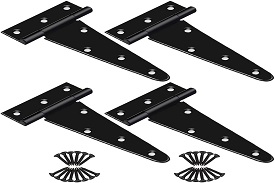
Both tee hinges and strap hinges are hinge types that are used in a variety of applications, frequently in metalworking, carpentry, and woodworking. They differ in usage and design, yet they fulfill comparable purposes. Tee hinges, so called because of its T-shaped appearance, are made up of two pieces. The door or gate is fastened to one side, while the frame or support is attached to the other. They are frequently utilized for heavy-duty applications like gates, shed doors, and barn doors because they offer stability and longevity. Contrarily, strap hinges are longer and more ornamental, looking like a long strap fastened to both the surface of the door or gate and the building next to it. They are frequently employed in ornamental or architectural contexts, such as on chests, cabinets, or external doors where aesthetics are important, and they are capable of supporting a sizable amount of weight. While both hinges provide strength and support, their usual uses and designs typically meet various demands and aesthetic preferences in woodworking and building tasks.
The building, remodeling, and maintenance operations in the residential, commercial, and industrial sectors are directly linked to the need for tee and strap hinges. These hinges are a necessary part of hanging doors, gates, cabinets, and other fixtures, which is why the hardware industry always needs them.
Under IS 206: 2010, every tee hinge and strap hinge is covered by the obligatory ISI Certification Scheme.
The requirements for mild steel tee and strap hinges, which are widely used in ordinary building construction, are described in this standard. It outlines the requirements for manufacture, chemistry, and physics, as well as the testing protocols, for various kinds of hinges.
Indian Standards Institute, or ISI was renamed the Bureau of Indian Standards (BIS) in 1987. The official mark that the Bureau of Indian Standards provides for manufacturers of various goods is the ISI Mark. It is used to indicate compliance with Indian standards (IS) set by the Bureau of Indian Standards (BIS) and has been used as a conformity marking for industrial products. Manufacturers received permission from BIS to use the ISI Mark on items that comply with relevant Indian requirements through the product certification program.
Only manufacturers (domestic or foreign) who produce the finished product will be awarded ISI Certification. This will not be given to any product importers, traders, dealers, or distributors.
The following documentation is required to get an ISI certification:
For more detailed information, please click here.
There are two approaches for Indian manufacturers to become certified with the ISI Mark:
Regular Procedure
With the possible exception of cases deemed "All India first," which might take up to 180 days, the licensing procedure is expected to be finished in 120 days. This timeline starts on the day the application is received, assuming that at different points in time the documentation, unit assessment, and product conformance are all deemed acceptable.
Step 1: Manufacturing Unit Customization in Compliance with Applicable Indian Standards
Step 2: Submission of the Application Form
For more detailed information, please click here.
Simplified Procedure
This is a much faster process than the standard procedure. After a factory inspection is deemed satisfactory and the initial evaluation establishes that the sample complies with the applicable Indian Standard(s), the license application process is expected to be finished in 30 days.
Step 1: Adapting the Manufacturing Unit to Comply with the Relevant Indian Standard
Step 2: Sample Testing
For more detailed information, please click here
The process of obtaining ISI Mark Certification for Foreign Manufacturers typically includes the following steps:
Step 1: Application
Step 2: Query Raised (If Any)
For more detailed information, please click here.
Brand Liaison provides helpful support for achieving ISI Mark Certification. Among our offerings are:
Please click here to get in contact with our team of specialists for a deeper explanation of the paperwork and steps needed to get ISI Mark Certification.